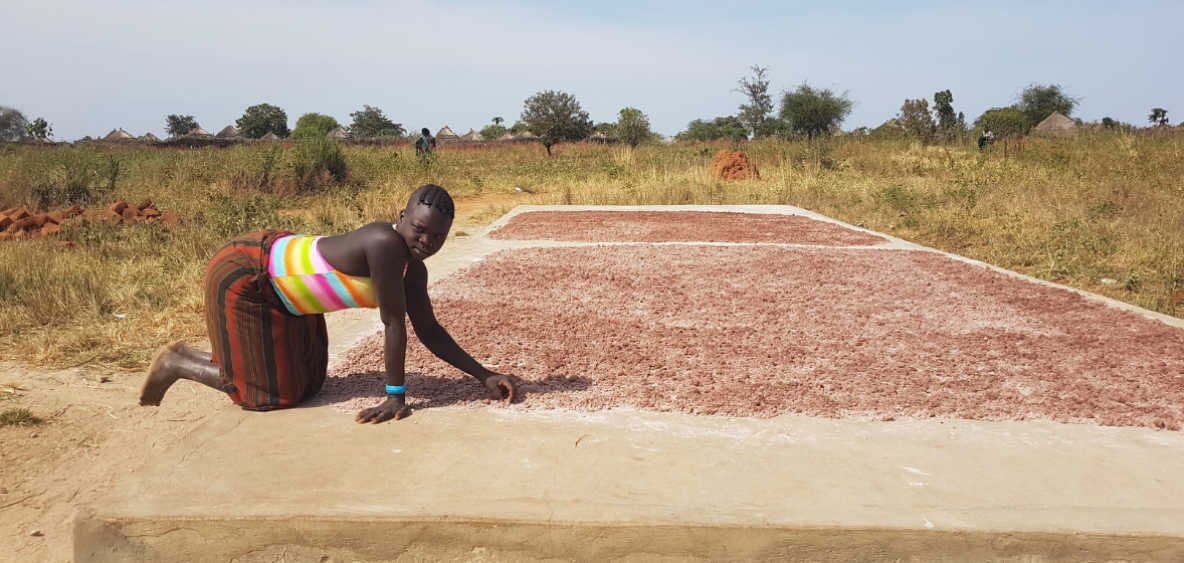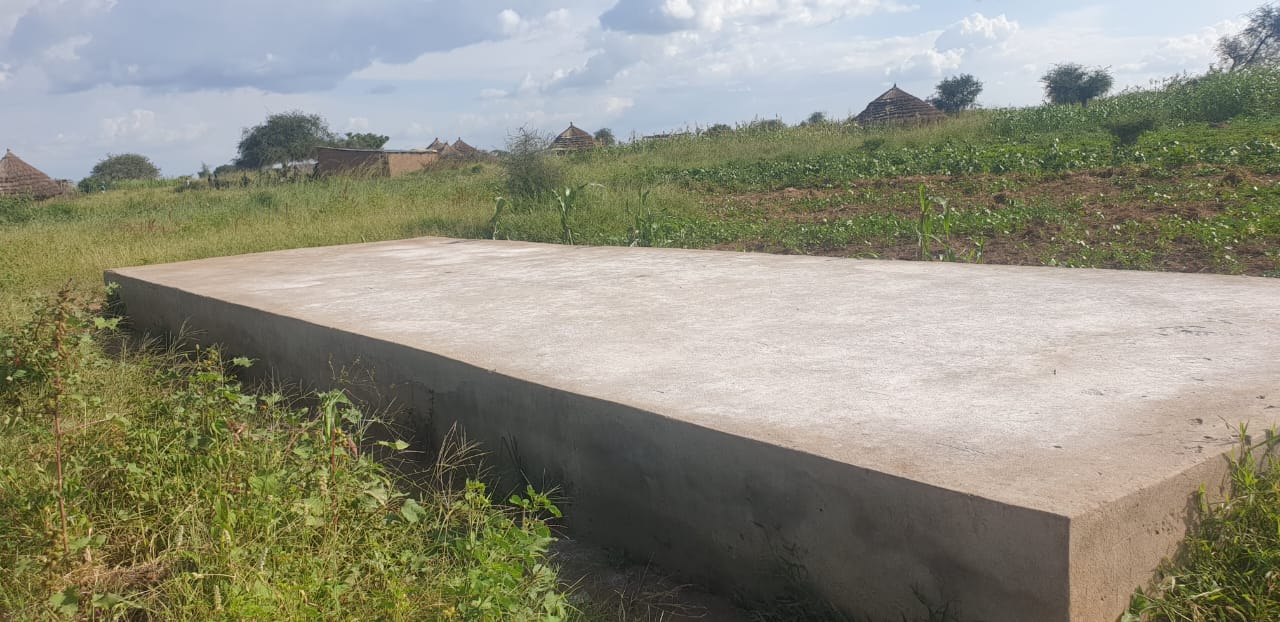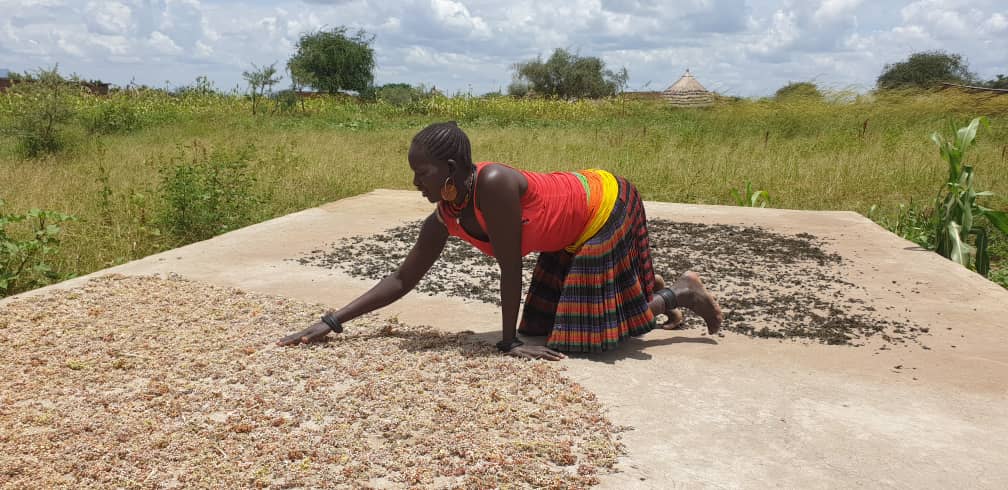 A villager spreading cereals on newly constructed drying slabs. Credit: Paul Emuria, Grassroots Alliance for Rural Development (GARD)
A villager spreading cereals on newly constructed drying slabs. Credit: Paul Emuria, Grassroots Alliance for Rural Development (GARD) Post-harvest food waste occurs at all levels of supply chains when there are no facilities for drying, transporting or storing. This is a leading cause of food insecurity in rural households in the Karamoja sub-region of Uganda. By listening to women, who are the main responsible actors in post-harvest care, the RFS Uganda project has helped install 4 concrete drying slabs to increase the health and financial outcomes of cereal and vegetable farming.
In the Karamoja sub-region of Uganda, the Resilient Food Systems (RFS) programme is working diligently towards the goal of increasing the productivity of maize, sorghum, cassava, sweet potato, vegetables and beans by 20%.
Led by the Food and Agriculture Organization of the United Nations (FAO) and the United Nations Development Programme (UNDP), the project Fostering Sustainability and Resilience for Food Security in Karamoja sub-region is in its final year of implementation and is raring to share data that communicate the progress of increasing agricultural productivity over the previous five years. Unfortunately, due to political interruptions and the COVID-19 pandemic, data collection has been a challenge. But this certainly doesn’t mean that the project team has been idle.
For what does increasing productivity matter if the fruits of farmers’ labour are not fit for consumption?
Post-harvest food loss and waste are leading causes of food insecurity amongst rural households in Karamoja. This disproportionately affects rural women due to them being largely responsible for handling, drying, cleaning and storage following cultivation.
During a community meeting at the project’s inception, women pointed out that food loss happens at every stage of the supply chain due to a lack of facilities. This loss prevents most farmers from growing and strengthening their agri-businesses.
And moisture is no friend to farmers in these circumstances, making drying a critical stage.
Traditionally, products are laid out on the ground to dry in the sun. This practice has significant health and financial implications for farmers and consumers since it increases the risk of aflatoxin contamination; a pervasive problem that costs Ugandans 577 million US dollars annually from liver cancer cases, and reduces agricultural exports of sorghum, maize and peanuts by 45%. Unfortunately, the problem is only going to get worse across Africa under the climate crisis.
While high-cost farm inputs like tarps exist to help mitigate aflatoxin contamination and help speed drying, they are largely inaccessible in low-income regions like Karamoja. This cycle leads to products being rejected from sale, and food being lost and wasted in a place that really needs it.
By listening to the women who spoke out about the lack of facilities for mitigating food loss, the RFS programme set out to better support them in making the most of their farm yields.
In 2021, the project installed 4 concrete cereal drying slabs, measuring 12 by 4 square metres each, strategically located between the four project Manyattas (community compounds) in Nagirigirioi and Lologooka parishes.

When the project was mobilised, the RFS team encouraged engagement from local farmers to ensure that they took ownership of the slabs to carry their benefits beyond the project.
Maria Lokiru, a farmer from Nagirigiryio village, explained that the local community, especially women, easily supported the project, knowing firsthand the importance of transforming methods of postharvest food handling and storage. The method she had access to before left crops vulnerable to contamination from aflatoxins, dust and soil following rain. “We couldn’t sell our produce due to poor quality produce,” she says. “We mobilised our husbands and sons to support the project, they offered land, women collected water and provided labour where necessary.” Women are the keepers of the drying yards and their dedication and enthusiasm for the project were instrumental in bringing them to life.
Lucy Aduko, another group member from Nagirigiryio village, explained that the benefits of the slabs have reached all aspects of community life. “[The] slab has multipurpose, we use it as a meeting point of all villages to discuss crosscutting issues in the village.”
”It’s almost a year now since we have been using this slab, which we guard jealously because our cereals can now be dried very clean without dust or soil; … we now make money which we use for other use.” – Maria Lokiru, Nagirigiryio village
Engaging with stakeholders at all levels is a critical objective
of the RFS Uganda project, and establishing at
least one multi-stakeholder platform per district is one way they will
bring together voices from across supply chains.
In 2021, the RFS Uganda project reported that sorghum and honey were the most preferred stakeholder platforms that local farmers were interested in participating in, so the establishment of these drying slabs is a critical tool in maximising their impact through the sorghum value chain. A recent training for regional facilitators of multi-stakeholder platforms will help ensure that the needs and objectives of everyone in the value chain are addressed, and foster cohesion and cooperation between actors.
This project is an excellent example of how listening to stakeholders can lead to real solutions that have a lasting impact and open new doors.

Subscribe to our monthly newsletter to receive updates on stories directly from the field across all our projects, upcoming events, new resources, and more.